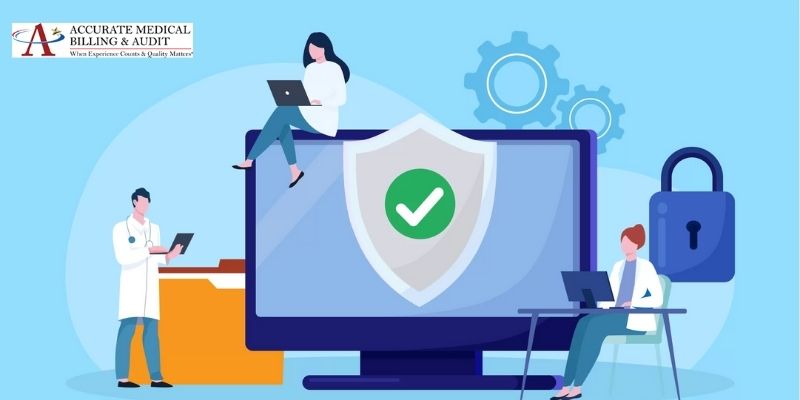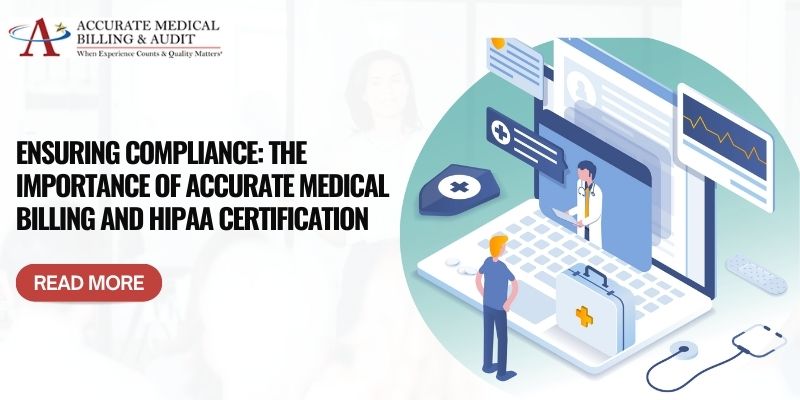As a healthcare professional, you know how vital correct medical billing is to the success of your practice. The risks of reimbursement rejections, fines, penalties, and in extreme circumstances, even loss of licensing or legal action increase when you don’t comply. All these can affect your practice. As a result, you must ensure compliance.
What Is Medical Billing Compliance?

Medical billing compliance refers to the adherence to rules and regulations in submitting and processing medical claims for healthcare services provided to patients. This includes compliance with laws like the Health Insurance Portability and Accountability Act (HIPAA).
Accurate service documentation, proper diagnosis and procedure coding, and accurate service billing are all components of medical billing compliance. Medical billing rule violations may have legal and financial repercussions, such as fines and legal action.
What is HIPAA Compliance?

HIPAA compliance refers to adhering to the various physical, technical, and administrative requirements of HIPAA.
For example, medical practitioners whose business associates and covered entities such as health plans, clearing houses, or health care providers need to protect the Protected Health Information (PHI) ‘s integrity.
The Importance of Accurate Medical Billing and HIPAA Certification
There are many things to pay attention to when you are a medical practitioner. There are additional challenges when it comes to accurate billing and HIPAA compliance. This is because of the ever-changing regulations, medical codes, and laws.
Nevertheless, it is essential to ensure compliance. Below are the significant reasons for accurate medical billing and HIPAA compliance:
1. It avoids overbilling or underbilling
Accurate medical billing is crucial for healthcare providers to avoid overbilling or underbilling patients. Overbilling can result in legal and financial consequences, while underbilling can lead to revenue loss and non-compliance with regulations.
Healthcare providers can better serve patients and maintain trust by appropriately charging them. It enables individuals to understand the cost of their care and make wise healthcare decisions.
Additionally, correct medical billing lessens administrative workload and boosts the effectiveness of healthcare operations. As a result, healthcare providers can concentrate more on providing for patients, which raises the standard of treatment in general.
2. Avoid damage to reputation
Accurate medical billing and HIPAA certification are critical for healthcare providers to avoid damaging their reputations. Incorrect billing can result in negative reviews, lawsuits, and loss of trust with patients.
Accurate medical billing also contributes to patient trust and openness. It enables patients to understand the cost of their care and can avoid uncertainty. Additionally, inaccurate billing can result in payment delays and affect the financial stability of healthcare providers. Patient trust and satisfaction may suffer as a result.
Also, HIPAA certification ensures that healthcare providers understand the importance of patient privacy and confidentiality. Violating HIPAA regulations can result in legal and reputational damage.
By prioritizing accurate medical billing and HIPAA certification, healthcare providers can protect their reputations, maintain patient trust, and provide high-quality care.
3. Ensures financial security
There will be severe consequences to your practice if there is a need for your medical billing to be more accurate. If this is the case, the insurance and patient will not pay your practice the total cost of the services they received.
Occasionally, it might not be a big concern because the loss could be insignificant, but you lose vast sums of money over a period in certain instances. Your practices are more likely to be questioned if your medical billing is inaccurate and ultimately non-compliant.
For this reason, you should ensure compliance. When you maintain valid billing and HIPAA certification, you can accomplish compliance quickly and enjoy financial security and increased earnings.
4. Security for patients
It is pivotal to be able to render accurate and efficient medical billing for any patient that is at your practice. The information kept is used for clearly identifying and recording all diagnoses and treatments that have been given. Whatever documentation is completed is a sizable portion of the patient’s medical file. It is, therefore, crucial to ensure data security.
The patient or a designated family member may need access to data such as their test results, x-rays, or the specifics of the prescription medication. If the information supplied needs to be corrected, it could jeopardize the patient’s safety and lower the quality and accuracy of future medical care.
Patients cannot tolerate incorrect information because it could adversely affect their health. Therefore, compliance with HIPAA certification helps with securing patients’ information.
5. Forecast the future of your practice
When your practice maintains compliance with accurate medical billing and HIPAA certification, you can be certain that insurance claims and patient bills will be submitted promptly. When your billing is precise, the future of your practice can be predicted, enabling you to plan your practice and provide the groundwork for your continued success.
In other words, accurate medical billing and HIPAA certification are essential factors that can help forecast the future of a healthcare practice. With precise billing, you, as a healthcare provider, can ensure a steady revenue stream and avoid financial losses.
Furthermore, inaccurate billing can lead to financial strain and damage the practice’s reputation, resulting in decreased patient satisfaction and trust. Generally, accurate medical billing and HIPAA certification are crucial for healthcare practices to remain successful and competitive in the healthcare industry. It can help forecast the practice’s future and ensure a positive and ethical reputation.
Conclusion
Accurate medical billing and HIPAA certification are essential for healthcare providers to maintain their reputation and avoid legal and financial consequences. By prioritizing accurate medical billing and HIPAA certification, healthcare providers can protect their reputations, maintain patient trust, and provide high-quality care.






I’ve been surfing on-line more than 3 hours these days, yet I never discovered any interesting article like yours. It…